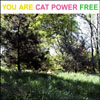
This Week: 50 Cent's overrated rap, Cat Power's puzzles, and Dirty Vegas' non-stop dance party
50 Cent

Get Rich or Die Tryin' (Shady/Aftermath)
He's been shot nine times. He hates Ja Rule. He got signed to Eminem's Shady Records. He's been shot nine times. His album (overseen by Em and his own mentor Dr. Dre) is the fastest-selling debut in Billboard history. He's been shot nine times. If only he had more to say. Or more fun saying it.
Queens gangsta 50 Cent has some of the attributes of his new handlers—like Eminem, he's willing to say anything about anyone (his breakthrough was an underground hit called "How to Rob," which provided dizzy rhyming detail of all the ways he intended to rip off established rappers), and like Dre, he trades on a real-life rap sheet for street cred—although even Dre's former protégé Snoop Dogg has never been shot nine times. 50, or "fitty," as he's invariably referred to here, has enough of what they call flow, but not enough of what they call personality. His prevailing mood is sullen, which makes him kind of a wet blanket. What's the point of mindless sex and violence if you don't even enjoy it?
There are stand-outs: on "Patiently Waiting," assisted by a spark-raising Eminem guest spot, he sounds mad and menacing enough to give the song's stalking beat a deliriously cocky edge. The big hit, the Dre-produced "In Da Club," gets as close as anyone has yet to making the "We Will Rock You" beat swing. And the reggae-tinged "Many Men" is genuinely mournful. But too often, even 50 Cent sounds bored with his bad-ass clichés. Talented? Sure, I guess. But those bullet scars prominently displayed in his photo shoot are all swabbed-and-dressed with no place to go. Did I mention he's been shot nine times?
—Jesse Fox Mayshark
Cat Power

You Are Free (Matador)
Chan Marshall, a.k.a. Cat Power, has become a darling of the indie-rock crowd. This reverence is in no small part because she has one of the few voices that can truly be called "ethereal." Add to that a good ear, enigmatic lyrics and the right friends to frame this voice, and her songs become haunting elegies.
They get inside your head as you try to puzzle them out. But at the heart of her songs there's a coldness. She doesn't understand the world and you'll never "get" her songs, because Marshall doesn't really get anything herself. You're on your own. She says as much on "Speak For Me" from her latest LP, You Are Free: "Speak for me, do you see the same signs/ Do you know how to read between the lines." It's almost as though she's afraid of imposing a meaning on them herself.
There are of course meanings, but they're so intensely visceral that you feel, more than understand them. (Cat Power's covers record fell flat because she couldn't impose her ambiguity on others' songs and make them work.)
This time around, Marshall mixes things up a bit. There are some uptempo songs with drums that make me wish she'd record a rock album with a full band (but perhaps she avoids it because great rock songs rarely hedge their bets).
"Free" is a plea to her fans against star worship; "He War" is an apparent anti-war anthem, but it's unclear whether she's singing about a literal war or a perhaps a sexual one. On "Good Woman," she leaves a lover "because I want for you to be a good man," but never hints at what was bad about the love. "Names" recounts the people she's known who died early and cruelly—there's no pathos in the words, but Marshall mourns them in the delivery.
Throughout the coldness of the lyrics contrasts deftly with the wariness of Marshall's voice—she beckons you as she erects walls to keep you out. And what keeps you engaged is the same thing that ultimately leaves you unsatisfied.
—Joe Tarr
Dirty Vegas

A Night at the Tables (Ultra)
When Mitsubishi sold its cars as perfect for a night out on the town in a commercial, it used Dirty Vegas' music to evoke the mood. On the band's latest release, A Night at the Tables, creates another soundtrack for such an evening.
Pop this in your player while you cruise the city searching for a party or listen to it as you get all dolled-up for a night of dancing and prancing. It pulsates like the best of them.
Relentless in its energy, A Night at the Tables spews forth a seamless megamix of gyrating booster tunes. It will tickle any mortal's propensity to let out some moves when the music hits, whether said mortal is in front of a mirror or on a dance floor. Throughout the course of A Night at the Tables, cascading layers of beats unfurl themselves onto one another, creating a relentless tide of musical energy and sheets of cross-pollinating thuds, thumps, and throbs that both tickle & slap one's aural senses.
On another level, each song, within itself, also germinates several musical motifs that then, so effortlessly, morph into successive ones. The patchwork of beats, motifs, and dance riffs that are laid out within, and between, the songs on A Night at the Tables are masterfully stitched together.
So buckle up, turn up the knob, and take it for a ride!
—Ekem Amonoo Lartson

March 6, 2003 * Vol. 13, No. 10
© 2003 Metro Pulse
|